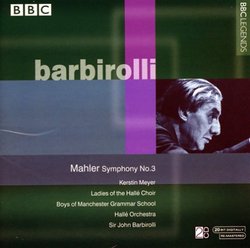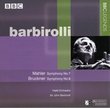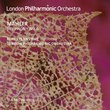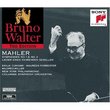| All Artists: Mahler, Meyer, Halle Orchestra, Barbirolli Title: Symphony 3: Recorded 1969 Members Wishing: 0 Total Copies: 0 Label: BBC Legends Release Date: 3/23/1999 Genre: Classical Style: Symphonies Number of Discs: 2 SwapaCD Credits: 2 UPC: 684911400427 |
Search - Mahler, Meyer, Halle Orchestra :: Symphony 3: Recorded 1969
 | Mahler, Meyer, Halle Orchestra Symphony 3: Recorded 1969 Genre: Classical
|
Larger Image |
CD DetailsSimilar CDs |
CD ReviewsAn elightening document still among the best 40 years later Larry VanDeSande | Mason, Michigan United States | 09/13/2007 (5 out of 5 stars) "Sir John Barbirolli's inspired studio recording of Mahler's huge Symphony No. 3 is a revelation for me. After hearing this music by a handful of conductors, some with big Mahler reputations, this was the first recording that not only fully expressed the composer's passion in a unified document, it also aptly demonstrated the overall scope and dimension of the tri-part score, with its two choral-vocal middle sections surrounded by a pair of purely orchestral halves. Sir John made this recording with his Halle Orchestra, contralto Kerstin Meyer and a pair of choirs about he time I was graduating from high school. A conductor beloved for his passion, generally slow but neither meandering nor episodic pace in recordings, and dedication to the music of countryman Edward Elgar (Barbirolli was born a cockney Londoner), it is Sir John's patience that allows every aspect of the score made available to us sonically in the first orchestral half, a 33-minute movement divided into 10 tracks on the first CD of this set. This opening section, labeled labeled Kraftig. Entscheiden, is where nature begin to sprout through the brass section. This long, volatile entrance is followed by sections of whimsical, childlike humor that are contrasted with grosteque musical imagery, Mahler's way of demonstrating nature's development and God's hand in same. The posthorn solo toward the end of this long movement's Sehr gemachlich section is outstanding and touching, setting the scene to end the opening of the repertory's lengthiest symphony, which goes on for more than 90 minutes. Kerstin Meyer's wide vibrato tends to work against simplicity in the "Das Knaben Wunderhorn" text that opens the choral section. The children's chorus that follows is somewhat unfocused but they sing with much affection and great beauty about meadows, forests, springtime and morning. Mahler's ode to nature could hardly be more fully realized than in this traversal, whose glories are often counted twofold by way of Sir John's deliberate pacing. The second orchestral half follows, an ode to more of what God and nature tell us. For the first time through this recording I became aware of a direct link to Mahler's predecessor symphony, the "Resurrection" in the Langsam Ruhevoll secitons, where themes began to sound familiar. Later on, one theme even reminded me of a famous moment from Beethoven's "Fidelio". The kinship between this nature and God-derived music and the previous "Ressurection" symphony, a paean to the Christian idea of afterlife, was illuminated and made more tangible for me than ever before. The playing of the Halle Orchestra is magnificent in this recording. The brass and woodwind sections, in particular, are displayed in great detail and are completely fulfilling in the 1969 recording made in Manchester's Free Trade Hall. While the Halle strings are not Philadelphia's, the all important timpani are also well represented in Sir John's reading. The overall detail, depth and balance is very good and is another in a long time of exceptional recordings from the BBC. British critic Tony Duggan has reviewed and recommended recordings of all the Mahler symphonies, incluidng this one. His explanations of this symphony about God and nature go into excrutiating details. For an enlightening view of the contents of this or any other Mahler symphony, see http://www.musicweb-international.com/Mahler/index.html" Barbirolli enhances his reputation as a great Mahlerian Santa Fe Listener | Santa Fe, NM USA | 04/13/2008 (5 out of 5 stars) "Born John the Baptist (Giovanni Battista) Barbirolli, which got simplified to John when he joined the British army, Barbirolli has been posthumously sainted in British music circles. He devoted his last decade before his death in 1970 to Mahler. Oddly, becasue Karajan excluded almost all of Mahler's music from the Berlin Phil's repertoire until a late conversion, it was an Englishman who brought the Third Sym. to the orchestra and trained them in it. This occurred during a Mahler fest that was followed, in May 1969, by this stduio recording with his own Halle Orchestra. Right off the bat one notices that the recorded sound is good commercial quality and that the orchestra plays well, even fervently. The ensemble and solo work aren't world class, but Barbirolli admirers have long ago adjusted to the Halle's limitations. What counts here, as always, is the conductor's deeply committed approach. Mahler's enormous, multi-colored sound world is difficult to make coherent, much less personal. Barbirolli manages to do that, putting himself in a league with Klemperer, Bernstein, Walter, and Tennstedt. All of them had enough strength to make Mahler their own. The other five-star reviewers have already given the particulars for each movement. Tempo and phrasing are at times routine rather than original (a feature that bothered the Gramophone's less-than-enthusiastic reviewer), yet the finale, with its old-fashioned portamenti and loving tenderness, could only have come from Barbirolli. What finally matters in Mahler is that you feel inexorably drawn into an imaginary world much larger than yourself, and for me, Barbirolli's Third accomplished that without question." Great Storytelling Doug - Haydn Fan | California | 03/24/2007 (5 out of 5 stars) "This is something special - perhaps Barbirolli may now be recognized as not only a great Mahler conductor, but the most underrated of all the 20th century podium geniuses. No doubt his leaving the New York Philharmonic for a backwater orchestra played a major role in this underestimating of his great talents.
In this performance we have a near-definitive first movement - not exactly anayltical as some modern versions are, but quite untouched for gripping storytelling. The works closeness to Humperdinck is manifest throughout, but this is a far more sinister and sophisticated depiction of the German Natur. Again, just as Monteux was so amazing in evoking the tale of Scheherazade so Barbirolli manages to produce the musical equivalent of a deep journey into a fantastic world of sprites and darker forces. Some of you may wonder if that was what Mahler had in mind, but it works for me! A fabulous recording in a style of music-making lost for ever." |

 Track Listings (10) - Disc #1
Track Listings (10) - Disc #1



